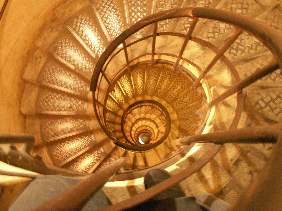from Corsons Inlet (Thanks to my workshop instructor for choosing this as one of the first two discussion poems for the class... The other one is this, equally amazing in an entirely different way, although both are perfect unions of form and function... bodes well for the course.)
the possibility of rule as the sum of rulelessness
and later in the poem...
no arranged terror: no forcing of image, plan,
or thought:
no propaganda, no humbling of reality to precept:
terror pervades but is not arranged, all possibilities
of escape open: no route shut, except in
the sudden loss of all routes:
Friday, May 25, 2007
Saturday, May 19, 2007
A little madness in my method
I've found lately that my poems have been originating in two distinct ways: from free-associative/stream of consciousness writing (I got this from Julia Cameron's Morning Pages idea, although being more of an afternoon/evening/middle of the night person, I just call them "rambling rites" and do them whenever I have a free 15 minutes and something to write about it. And of course, I use the computer. This is the 21st century, after all. So yeah, basically, it's nothing like Julia Cameron's Morning Pages, but that was the genesis of it, anyway.)
After the free-writing, the next step in this method is to highlight the better parts and then delete the parts between; then start moving lines around, coupling, quatraining, or otherwise stanzafying them and seeing what fits where, before finally trimming around the edges; letting the finished piece sit for a day or two and then re-reading to see if it resembles an actual poem.
And the other method is just writing down two or three lines that come to me and then expanding and building a poem around it. This is the way I wrote for my entire life (well, ever since I started writing poetry regularly, about age 14, I guess) up until I first tried the rambling rites about three years ago. But it was still my primary method up until this year. Now, I'm leaning toward the other.
I think the reason I'm leaning this way is that the free-associative method tends to yield a more dreamlike, lyrical product, whereas the latter produces more narrative stuff. And since the writing program I'm in strongly favors more formalist work (neither too narrative nor too lyrical) I've naturally rebelled and wanted to run in an even more informal direction than I was already headed. We'll see how well that goes over with this summer workshop (I'm guessing not that well. But this is my last year and my skin's grown pretty thick. Nobody's going to beat the free verse out of me and turn me into a meter-head.)
After the free-writing, the next step in this method is to highlight the better parts and then delete the parts between; then start moving lines around, coupling, quatraining, or otherwise stanzafying them and seeing what fits where, before finally trimming around the edges; letting the finished piece sit for a day or two and then re-reading to see if it resembles an actual poem.
And the other method is just writing down two or three lines that come to me and then expanding and building a poem around it. This is the way I wrote for my entire life (well, ever since I started writing poetry regularly, about age 14, I guess) up until I first tried the rambling rites about three years ago. But it was still my primary method up until this year. Now, I'm leaning toward the other.
I think the reason I'm leaning this way is that the free-associative method tends to yield a more dreamlike, lyrical product, whereas the latter produces more narrative stuff. And since the writing program I'm in strongly favors more formalist work (neither too narrative nor too lyrical) I've naturally rebelled and wanted to run in an even more informal direction than I was already headed. We'll see how well that goes over with this summer workshop (I'm guessing not that well. But this is my last year and my skin's grown pretty thick. Nobody's going to beat the free verse out of me and turn me into a meter-head.)
Subscribe to:
Posts (Atom)

